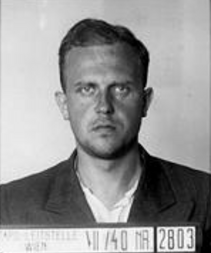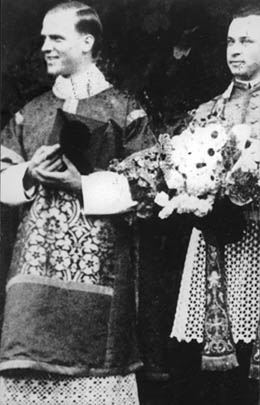Roman Karl Scholz CanReg

Personalia
Born:
Died:
Profession:
Persecution:
Imprisoned 22.07.1940 - 10.05.1944,
Murdered 10.05.1944
Memberships
Curriculum Vitae
Roman Karl Scholz was born the illegitimate son of Josefa Scholz and grew up in the care of his grandmother. As he was exceptionally talented, he was allowed to attend grammar school in Moravian Schönberg [today: Šumperk in the Czech Republic] after elementary school. During this time, he came into contact with the Catholic youth movement Neuland, as well as the German nationalist ideas that were particularly pronounced in the so-called 'Sudentenland'. He graduated in June 1930 and moved to Vienna in the same year to join the Augustinian canons in Klosterneuburg. He made his solemn profession in 1934. After completing his theological studies at the Klosterneuburg House School, Roman Karl Scholz was ordained a priest on May 21, 1936.
With the outbreak of war in 1939, he renamed his resistance group the "Austrian Freedom Movement". The group was largely made up of pupils and students of Roman Karl Scholz.
The network of his resistance group spread from Vienna to Lower Austria, Upper Austria and Tyrol. An 'executive committee' is formed, which includes Roman Karl Scholz and Viktor Reimann, Hanns Georg Heintschel-Heinegg, Gerhard Fischer-Ledenice, Hans Zimmerl and Luise Kanitz as leader of the women's group. In 1939, Gestapo informer Otto Hartmann also joined the group. While Otto Hartmann advocated terrorist attacks and assassinations, which only Hans Zimmerl supported, the majority pursued a more cautious strategy: they wanted to create many small groups of 30 men each (so-called "ranks"), which in turn were divided into sub-groups of three. This is intended to create a wide network throughout Austria.
The size of the entire movement is estimated at around 100-400 people. The training courses for the leaders of the ranks were held in the apartment of Hans Georg Heintschel-Heinegg's parents in Vienna's Prinz-Eugen-Straße.

In spring 1940, Hans Zimmerl led a particularly active action group that produced and distributed flyers.
In April 1940, contact was established with the French legation in Budapest and with Soviet and American representatives in Bratislava via a courier, the student Rudolf Strasser. As the informer Kurt Koppel was employed in a Pressburg branch of a publishing house, he offered to help Roman Karl Scholz pass on the news. By agreeing to this proposal, the Gestapo had access to this exchange of information.
In 1939 and 1940, the first contacts were made between the resistance movement around Roman Karl Scholz and the resistance movement of the same name around the former official of the Procurator Fiscal's Office, the lawyer Karl Lederer. The Großösterreichische Freiheitsbewegung around Jacob Kastelic was the third cooperating group. In April 1940, the three groups decided to coordinate their organizations. For security reasons, a central office is not set up. However, Gestapo confidants had already been infiltrated into all three groups by this time. The total number of members of these groups is estimated at around 1,000 people.
The three resistance groups are broken up as a result of Otto Hartmann's betrayal and Roman Karl Scholz is arrested by the Gestapo on July 22, 1940. It took almost four years before he was put on trial. During this time, he was repeatedly interrogated and severely tortured without betraying any of his associates and was transferred from prison to prison. Even an intervention by Hermann Göring's sister, with whom friends of his were in contact, was unsuccessful. Roman Karl Scholz is sentenced to death by the People's Court on February 23, 1944. The telegram to Adolf Hitler, in which Theodor Cardinal Innitzer requests a pardon, is not even answered.
After years in prison, Roman Karl Scholz is executed with a guillotine for high treason on May 10, 1944.
Places
Place of activity:
Death Place:
Honoring:
Citations
- Mikrut, Jan (1999): Blutzeugen des Glaubens. Martyrologium des 20. Jahrhunderts (Wien), p. 225–233.
- Wikipedia unter de.wikipedia.org/wiki/Roman_Karl_Scholz
- Zur Erinnerung unter roman-karl-scholz.zurerinnerung.at
